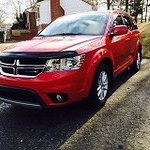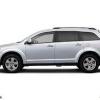-
Posts
98 -
Joined
-
Last visited
-
Days Won
1
Reputation Activity
-
 NiceTrip got a reaction from dgncsk in Intermittent vibration front left wheel at speed
NiceTrip got a reaction from dgncsk in Intermittent vibration front left wheel at speed
I see this is from September, so you may have solved it by now, but it sounds like you have a sticky caliper causing some brake drag. I'm dealing with the same issue right now. You don't notice it at slow speeds or short distances, but if you travel at freeway speeds for 10 or 15 miles, the brake will heat up enough from the drag to begin to warp the disc, causing the vibration. Once the disc is warped, the vibration will be very noticeable when you apply the brake. Usually the issue subsides when the rotor cools, but if it gets hot enough the rotor can warp permanently and the only solution is to replace it. To check for this, next time the vibration happens, stop the car, and check the temperature of both front wheels. If one wheel is noticeably hotter than the other you definitely have a brake drag. Use caution, as a dragging brake can make a wheel hot enough to cause burns. Other symptoms of this issue include faster brake wear on the side that's dragging. You may notice more brake dust on that wheel, an if you remove the wheel, you'll see the pads more worn on the dragging side.
To further test and diagnose the issue, with the car parked, engine running, rear wheels blocked, parking brake set and transmission in neutral, stomp the brake pedal a couple of times as hard as you can. Turn the engine off but leave the car in neutral. Jack up the front of the vehicle on both sides, then rotate each wheel one at a time and compare how easy it is. The one that's sticking should be noticeably harder to rotate. Now remove the wheel on the sticky side, and trace the rubber brake hose back to where it connects to the steel brake line, and crack that connection loose with a wrench. If the wheel rotates freely now, the problem is upstream of the brake hose/brake line connection. Trace the steel line back to the ABS Hydraulic module. If you don't find any kinks in the brake line, suspect the ABS module. If on the other hand the wheel/hub does not rotate significantly easier, the blockage is downstream of the point you opened the line. Tighten that one back up and then loosen the bleed screw on the caliper. If that frees it up, the brake hose is the likely culprit. If it's still stuck, the caliper is at fault. Check the caliper slides to see if that's where it's sticking, and if not, replace the caliper.
When done testing you are going to want to bleed that wheel just in case you introduced any air into the system when you opened the line.
In my case, I've changed the caliper and the hose without solving the problem. (I didn't take the time to diagnose, thinking it was much more likely to be a caliper). This weekend I'm changing the ABS module.
-
 NiceTrip got a reaction from jkeaton in Intermittent vibration front left wheel at speed
NiceTrip got a reaction from jkeaton in Intermittent vibration front left wheel at speed
I see this is from September, so you may have solved it by now, but it sounds like you have a sticky caliper causing some brake drag. I'm dealing with the same issue right now. You don't notice it at slow speeds or short distances, but if you travel at freeway speeds for 10 or 15 miles, the brake will heat up enough from the drag to begin to warp the disc, causing the vibration. Once the disc is warped, the vibration will be very noticeable when you apply the brake. Usually the issue subsides when the rotor cools, but if it gets hot enough the rotor can warp permanently and the only solution is to replace it. To check for this, next time the vibration happens, stop the car, and check the temperature of both front wheels. If one wheel is noticeably hotter than the other you definitely have a brake drag. Use caution, as a dragging brake can make a wheel hot enough to cause burns. Other symptoms of this issue include faster brake wear on the side that's dragging. You may notice more brake dust on that wheel, an if you remove the wheel, you'll see the pads more worn on the dragging side.
To further test and diagnose the issue, with the car parked, engine running, rear wheels blocked, parking brake set and transmission in neutral, stomp the brake pedal a couple of times as hard as you can. Turn the engine off but leave the car in neutral. Jack up the front of the vehicle on both sides, then rotate each wheel one at a time and compare how easy it is. The one that's sticking should be noticeably harder to rotate. Now remove the wheel on the sticky side, and trace the rubber brake hose back to where it connects to the steel brake line, and crack that connection loose with a wrench. If the wheel rotates freely now, the problem is upstream of the brake hose/brake line connection. Trace the steel line back to the ABS Hydraulic module. If you don't find any kinks in the brake line, suspect the ABS module. If on the other hand the wheel/hub does not rotate significantly easier, the blockage is downstream of the point you opened the line. Tighten that one back up and then loosen the bleed screw on the caliper. If that frees it up, the brake hose is the likely culprit. If it's still stuck, the caliper is at fault. Check the caliper slides to see if that's where it's sticking, and if not, replace the caliper.
When done testing you are going to want to bleed that wheel just in case you introduced any air into the system when you opened the line.
In my case, I've changed the caliper and the hose without solving the problem. (I didn't take the time to diagnose, thinking it was much more likely to be a caliper). This weekend I'm changing the ABS module.
-
 NiceTrip got a reaction from Yong Hong in Insurance Costs
NiceTrip got a reaction from Yong Hong in Insurance Costs
I will pay $140 more per six months when I remove the 1996 Nissan Quest and replace it with the 2009 Dodge Journey, both full Collision and Comprehensive coverage with $250 Deductible. Considering the replacement cost of the new vehicle is 10x or more than the one it's replacing on the policy, that seems pretty reasonable.
-
 NiceTrip got a reaction from Journey_SeXT in 2011- Rear Brakes Primary for stopping?
NiceTrip got a reaction from Journey_SeXT in 2011- Rear Brakes Primary for stopping?
If your rear wheels are making more dust than the fronts, something is definitely wrong. Most likely the brakes aren't relasing fully and are slightly dragging. When I did my rear brakes - at less than 36k miles - the left rear pads were worn completely away while the rights still had plenty of lining. Upon disassembly, I found the left caliper pins had no lubrication and a thin coating of rust. I cleaned an lubricated them thoroughly, and immediately took it to the dealer to complain about the defect. They replaced both rear calipers under warranty, but the funny thing is - the pins aren't in the calipers, but in the brackets. And I'm pretty sure they didn't change the brackets. Oh well, I think my lube job on the pins is doing the trick because I haven't had any more problems.





